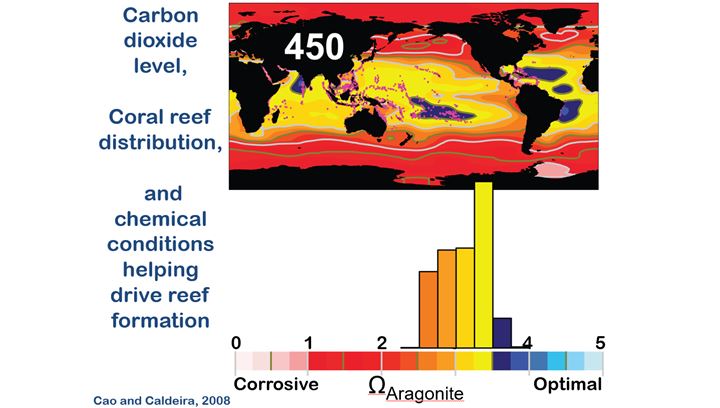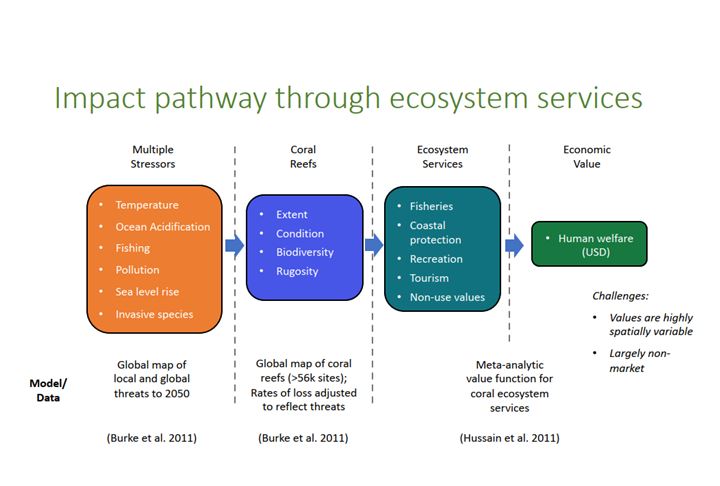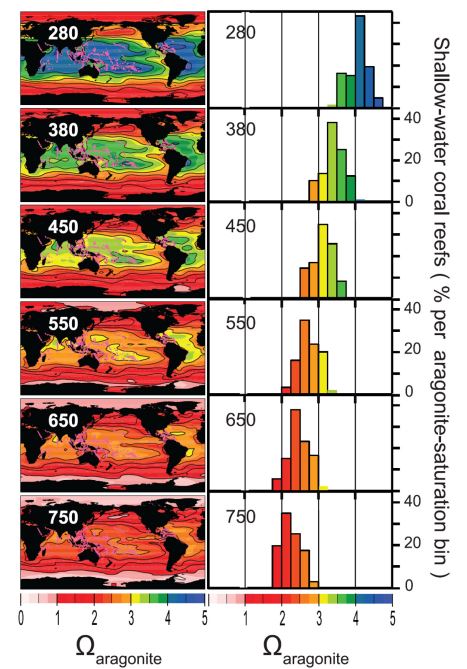Purpose
- Investigates the causes of economic imbalances.
- Explores and develops market-based solutions.
Summary
The ocean provides critical services that are essential to human well-being, including food, biodiversity, recreation, and tourism. Climate change, however, poses myriad threats to oceans. Ocean acidification and warming (OAW), which are driven by oceans absorbing emitted carbon dioxide (CO2) and climate change, are having significant detrimental impacts on the services that oceans provide. While these impacts have substantial economic value, OAW has yet to be incorporated into estimates of the social cost of carbon (SCC). The SCC is a metric representing the damages, in dollars, from an incremental ton of CO2 released into the atmosphere. The SCC is used by federal policymakers and others as a measure of the benefits of mitigating carbon emissions. However, climate change’s impacts on ocean systems are not accounted for in existing SCC estimates. To address this gap, RFF convened an interdisciplinary group of experts to study how researchers could incorporate OAW damages into the SCC.

Description
The SCC (also sometimes referred to more generally as the social cost of greenhouse gases, or SC-GHGs) is a metric representing the damages, in dollars, stemming from an incremental ton of CO2 released into the atmosphere. Recent advances in SCC estimates represent a major step forward towards a comprehensive account of the impacts of greenhouse gases emissions on society, but do not account for the effects of ocean ocean acidification and warming.
The goal of this project was to convene experts in climate change’s impacts on ocean systems to identify research needs required to incorporate those impacts into the SCC. To achieve this goal, RFF organized three virtual workshops of a combined 40 researchers with relevant biophysical and economic expertise. The three workshops were held from 12-2pm ET on October 27, November 17, and December 1 of 2023.
In the first workshop, RFF presented the details of the Greenhouse Gas Impact Value Estimator (GIVE) model, including a deep dive into the existing “damage functions” to serve as examples of what it means to build a damage function. The second workshop focused on modeling climate change’s impacts on coral reefs, which started with opening remarks from Ken Caldeira and Luke Brander, followed by a robust discussion. The third workshop focused on climate change’s impacts on fisheries, which started with opening remarks from Chris Moore and William Cheung, once again followed by robust discussion.
Workshop participants highlighted many varied impacts to consider, including factors such as temperature extremes (rather than only averages), path dependencies, adaptation, and regional variation in impacts. RFF summarized the key insights developed in the workshops in a report written by Brian Prest (RFF), Jordan Wingenroth (RFF), and Frank Errickson (Princeton), with review and contributions from ocean researchers Bernardo Bastien Olvera, Luke Brander, William Cheung, Chris Moore, and Rashid Sumaila. That report, which is publicly available on RFF’s website, presents the information conveyed at the workshops in a streamlined format, setting a course for future collaborative work to incorporate ocean impacts into more comprehensive SC-GHG estimates.


Reprinted from Cao & Caldeira 2008, © 2008 American Geophysical Union
Purpose
The project explored challenges and opportunities of modeling the economic effects of the impacts of climate change on ocean systems, such as biodiversity losses, fishery impacts, non-use value, coral reefs, and recreation/tourism. The Social Cost of Carbon is an important metric that, in quantifying the cost of emissions, can support market-based solutions to mitigating those emissions. It is used by federal, state, and local policymakers to evaluate the benefits of potential policies against the potential cost of regulation. It is also frequently used by corporations to evaluate the impact of their own proactive efforts to address climate change, and can inform markets for carbon offsets, or tradable certificates linked to activities that lower the amount of carbon dioxide in the atmosphere.
Scope
The audience for this project is primarily decisionmakers at the national level in the United States and the broader global research community around the Social Cost of Carbon. The work also has important implications for other stakeholders at the local level and around the world.
Information Dissemination
We published our results in a publicly available report which was then distributed by email to RFF's list of several thousand subscribers. The findings will also be disseminated on social media.
Amount Approved$56,000.00
on 6/8/2023
(Check sent: 6/21/2023)
Annual Report by Resources for the Future describing Foundation-funded study.